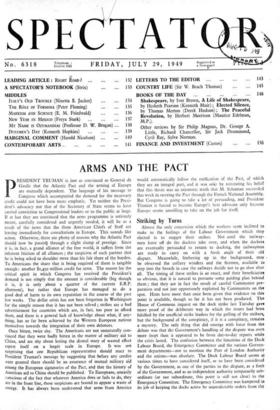ARMS AND THE PACT
pRESIDENT TRUMAN is just as convinced as General dc Gaulle that the Atlantic Pact and the arming of Europe are mutually dependent. The language of his message to Congress which accompanied the demand for the necessary credit could not have been more emphatic. Yet neither the Presi- dent's advocacy nor that of the Secretary of State seems to have carried conviction to Congressional leaders or to the public at large. If at last they are convinced that the arms programme is seriously meant, carefully considered and urgently needed, it will be as a result of the news that the three American Chiefs of Staff arc leaving immediately for consultations in Europe. This sounds like action. Otherwise, there are plenty of reasons why the Atlantic Pact should now be passink through a slight slump of prestige. Since it is, in fact, a grand alliance of the free world, it suffers from the inherent friction of all alliances ; the suspicion of each partner that he is being asked to shoulder more than his fair share of the burden. To Americans the share that is being required of them is tangible enough: another $i,45o million credit for arms. The reason for the critical spirit in which Congress has received the President's demand is not simply that the amount is considerable (big though it is, it is only about a quarter of the current E.R.P. allotment), but rather that Europe has managed to do a good deal of harm to its own reputation in the course of the past few weeks. The dollar crisis has not been forgotten in Washington for the simple reason that it has not been solved ; strikes are a bad advertisement for countries which are, in fact, too poor to afford them, and there is a general lack of knowledge about what, if any- thing, has so far been achieved by the Western European nations themselves towards the integration of their own defences.
Once bitten, twice shy. The Americans arc not unnaturally con- vinced that they were badly bitten in the matter of military aid to China, and are shy about letting the dismal story of wasted effort
repeat itself on a larger scale in Europe. It was not surprising that one Republican representative should react to President Truman's message by suggesting that before any credits were granted there should be an assurance of mutual military aid among the European signatories of the Pact, and that the history of American aid to China should be published. To Europeans, uneasily conscious of the fact that whatever America does or fails to do, they are in the front line, these suspicions are bound to appear a waste of energy. It has always been understood that arms from America
would automatically follow the ratification of the Pact, of which they are an integral part, and it was only by reiterating his belief that this thesis was an axiomatic truth that M. Schuman succeeded this week in steering the Pact through the French National Assembly. But Congress is going to take a lot of persuading, and President Truman is forced to become Europe's best advocate only because Europe seems unwilling to take on the job for itself.


































